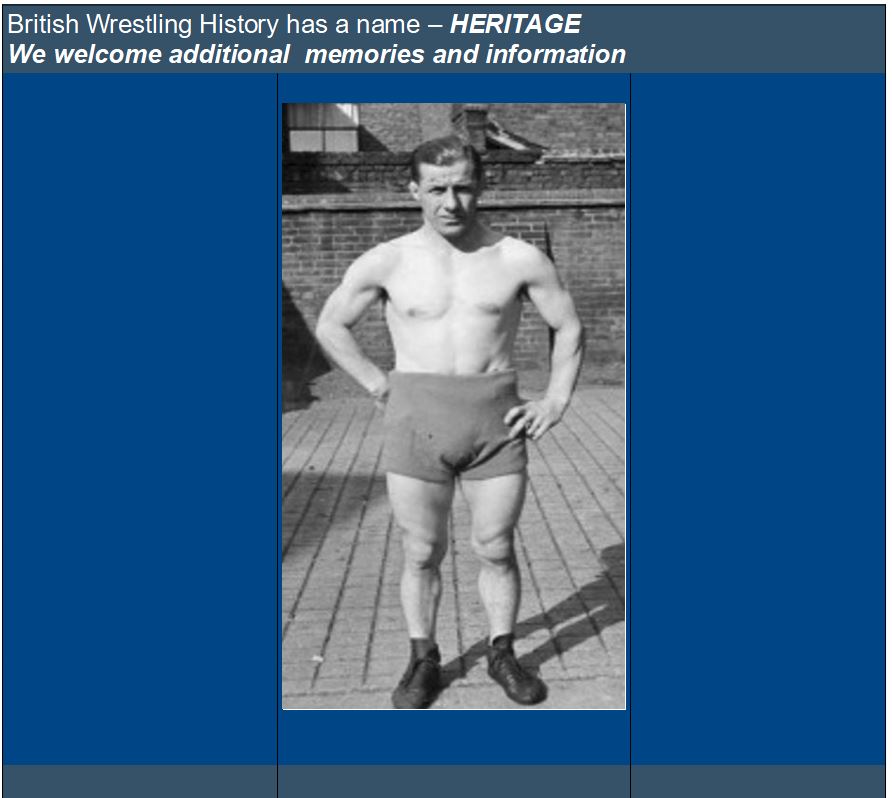Wrestling Heritage welcomes memories, further information and corrections.

Joe Reid
Wrestling Heritage readers with any recollection of Leigh’s Joe Reid probably remember a veteran well past his prime working until the mid sixties often against Jim Bevan.
Cast aside such thoughts and celebrate one of the great Lancashire catch wrestlers, champion amateur, and successful professional for three decades.
Joe Reid was born in Leigh, Lancashire, in 1905. A coal miner by trade, the tell tale signs of scars on his back were there for wrestling fans to see. He was schooled in both amateur style and Catch as Catch Can style wrestling, trained by Harry Pennington. They were members of the Leigh Harriers Wrestling Club, which at the time was one of the best amateur clubs in the country.
It was an education that was to create one of the finest professional wrestlers of the pre and post war years. Only his diminutive stature has prevented the name Joe Reid being remembered with the honour of that given to Francis St Clair Gregory, Eric Taylor and Ernie Riley.
In 1930 Joe represented England in the first ever Empire Games taking the silver medal after losing to Canadian James Trifunov in the bantamweight final. Four years later when the games were held in London Joe again took to the podium, this time settling for a bronze medal.
Between times Joe competed in the 1932 Los Angeles. Joe was one of two wrestlers representing Great Britain, the other being Joseph Taylor. The global economic downturn and the distance from Europe caused many countries to send smaller teams and fewer competitors took part than in any Olympics since 1904. Joe Reid was eliminated after losing two of his three matches in the freestyle bantamweight division and finished fifth in the placings. The victory was over Greece’s Georgios Zervinis, a veteran of three Olympic Games. Joe’s two losses were against the eventual gold and bronze medal winners, American Bob Pearce and Finland’s Aatos Jaskari. In Britain he was unassailable in the bantamweight division and won the British bantamweight championship every year from 1931 to 1935.
A very slight man, therefore, to enter the world of professional wrestling in the 1930s, where big men like Jack Pye, Norman the Butcher and Carver Doone were the fans’ favourites.
Joe made his professional debut in May, 1935 at Preston, against the heavier Sid Milligan of Rochdale. The Lancashire Evening Post reported, “Joe Reid, the collier from Leigh, who has gained very nearly every possible success in amateur wrestling, won his first fight at the Majestic, Preston, last night, defeating Sid Milligan by two falls to one in a ten round catchweight contest…..Reid’s superior craft gave him the victory – indeed he was never fully extended,” Joe readily admitted that he saw wrestling as a means of escaping a life down the pits.
Throughout the second half of the 1930s Joe travelled extensively, gaining a good reputation usually against heavier opponents that included Bully Pye, Harry Rabin and Black Butcher Johnson.
Naturally Joe was called up during the Second World War, which put his wrestling career on hold. He was captured whilst serving and spent much of the war enduring a Japanese Prisoner of War camp. In 2002 Joe was posthumously nominated as a local hero who deserved honouring in the Leigh town centre walk of fame.
For a short time in 1948 Joe was British lightweight champion in northern rings but in those days, there was no nationally recognised set of champions. At the time Joe was one of the trainers at Norman Morrell’s gym in Bradford. One of the students was a young George Kidd. Kidd was granted a title match against his tutor, Joe Reid. Joe warned Kidd that no favours would be granted. George managed to apply a figure four leg lock on Joe, but Joe would not submit, which resulted in Joe being badly injured though retaining his title. Joe recovered and eventually lost his British title to Cliff Beaumont.
Joe continued wrestling for many years, until the 1960s in fact. By then he was well past his prime, slower in his movements, but a wrestling mind as alert as ever, remembered by Heritage member Mike Agusta, who told us that one of the greatest memories of his wrestling career was visiting Joe Reid’s gymnasium.
Joe Reid died in 1968.
Jim Reid
Leigh’s Jim Reid didn’t achieve the fame of his older brother, Joe, and his career did not extend so long. He was, nonetheless, a genuine Lancashire catch wrestler who continued to work the professional rings of northern England from 1935 until around 1950.
The Great Marcus
The Great Marcus had a great teacher; he was Marcus Reid, the son of former Olympian and professional Joe Reid. We have found a few pro matches for The Great Marcus in the mid 1960s, but he seems to have made little impact. Opponents included Jim Bevan, Mike Agusta, Don Boardman and his old man Joe Reid. Marcus Reid was born in 1937 and died 21st May, 2007, aged 69.
Reviewed 28/02/2022
